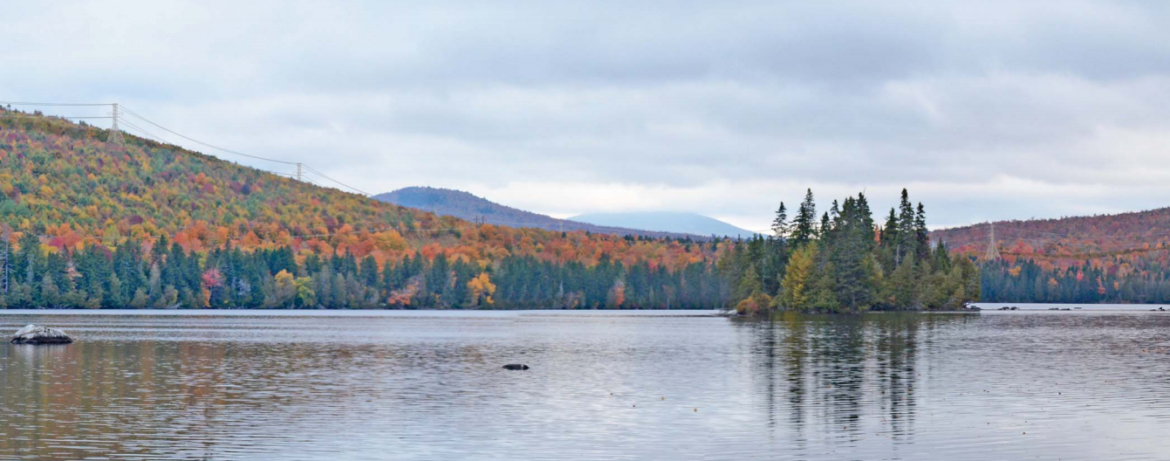By GARRY RAYNO,
InDepthNH
CONCORD — Massachusetts utility regulators will soon decide on a buffet of options for almost 10 terawatt hours of clean renewable energy, but will they be willing to “put all of their eggs in one basket?”
Among the bids are two from Northern Pass and Hydro-Quebec that would use the proposed 192-mile, $1.6 billion high-voltage transmission line stretching from Pittsburg to Deerfield currently before the New Hampshire Site Evaluation Committee.
The bids would use most of the line’s capacity, said Robert Grace, managing director and president of Massachusetts-based Sustainable Energy Advantage.
Grace spoke Tuesday at the New Hampshire Energy Summit at the Holiday Inn in Concord. He wondered what criteria Massachusetts regulators would use to determine the winning bid.
What if the proposed line fails to obtain a state permit, he asked, noting an earlier attempt to secure renewable energy for a three-state consortium including Massachusetts showed risk aversion to a “big deal.”
“They could be adverse to putting all their eggs in one basket,” Grace said about Massachusetts regulators.
One Northern Pass bid would use only hydro-generated power while the other would use a combination of hydro and wind to meet the clean energy goals.
But Grace and Aaron Geschiere, principal analyst for Sustainable Energy Advantage, both told the summit there are other viable transmission projects, including National Grid’s Granite State Power Link, which would use all new wind power and existing transmission line right-of-ways through Vermont and New Hampshire.
However, the line through Vermont sparked heated debate 20 years ago and conservation officials believe the new plan would reopen the debate.
The National Grid proposal would require expanding the right-of-way about 150 feet to accommodate the new high-voltage transmission line.
The New Hampshire portion of the existing right-of-way does not have similar issues with the new line.
Grace said the proposal came late in the run up to submitting bids for the Massachusetts Clean Energy solicitation and noted National Grid recently pushed for proposals that encourage the development of new renewable energy generators as its plan would do.
Both National Grid and Northern Pass developer Eversource are major electricity utilities in Massachusetts and helped write the request for proposals and will evaluate the 46 submitted bids.
The evaluation committee is expected to announce its choice Jan. 24 and submit it to the Massachusetts Department of Public Utilities, which will make the final decision by the end of April.
The goals of the Massachusetts project include encouraging new renewable energy sources and new transmission lines. Grace said how the selection committee weights those options and others to determine the winning proposal is not known and probably will not be until it is submitted to the DPU.
He suggested the selection process could turn into a “steel cage match” between Northern Pass and National Grid. “Either they haven’t figured it out yet, or they don’t agree at all,” Grace said.
Massachusetts’ solicitation has produced bigger bids and bigger coalitions and brought many new players to the table, he said.
The proposals range from Northern Pass and National Grid to others with small wind and solar projects as well as large hydro generation and they come from all over New England, New York, the Maritimes and Quebec.
A majority of the proposals would use wind power. The wind and solar power in many plans would be supplemented by large hydro when wind and solar are not available.
An off-shore wind project Revolution Wind submitted a bid which is the first time it has competed head-to-head with other renewable projects Geschiere said.
The bids include other transmission projects as well including one in Maine along existing transmission right-of-ways, the New England Clean Power Link, to be buried under Lake Champlain and then underground to Rutland, Vt.
Grace noted the project, developed by Transmission Development Inc., a subsidiary of Blackstone, a multinational investment firm, has all the necessary approvals and has not attracted the same opposition as Northern Pass.
Another transmission project would be buried under the ocean from the Maritimes to Boston.
Grace said the Massachusetts program will diversify electricity generation and allow existing fossil fuel generation to shut down without adding more greenhouse gases to the environment.
That will have a big impact on New England in general, he said, and should put downward pressure on prices and the forward capacity market.
Adjudicative hearings on Northern Pass continue Wednesday with the cross-examination of the economic panel hired by the Counsel for the Public to review information presented by Eversource.
The SEC recently delayed making its final decision for five months until the end of February.
Eversource had hoped to have all federal and state permits by the end of this year with construction to begin next year and the transmission line finished by the end of 2020.
If it receives all its permits, project officials said earlier, construction could begin in April.
Garry Rayno can be reached at garry.rayno@yahoo.com






